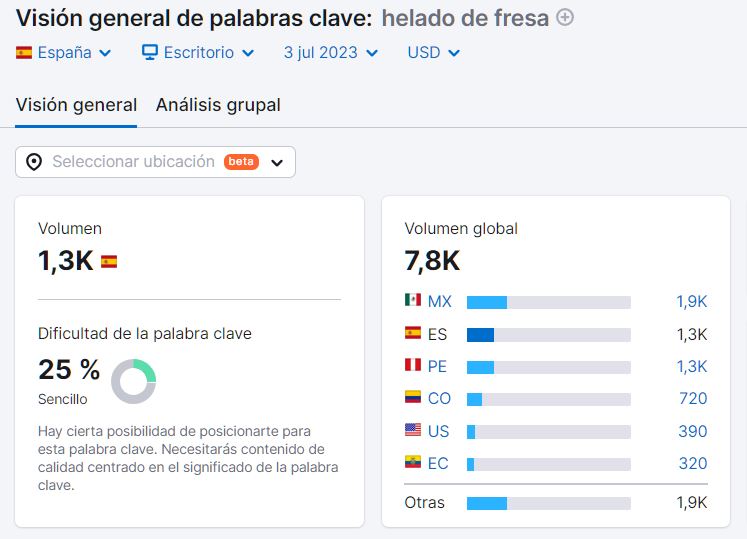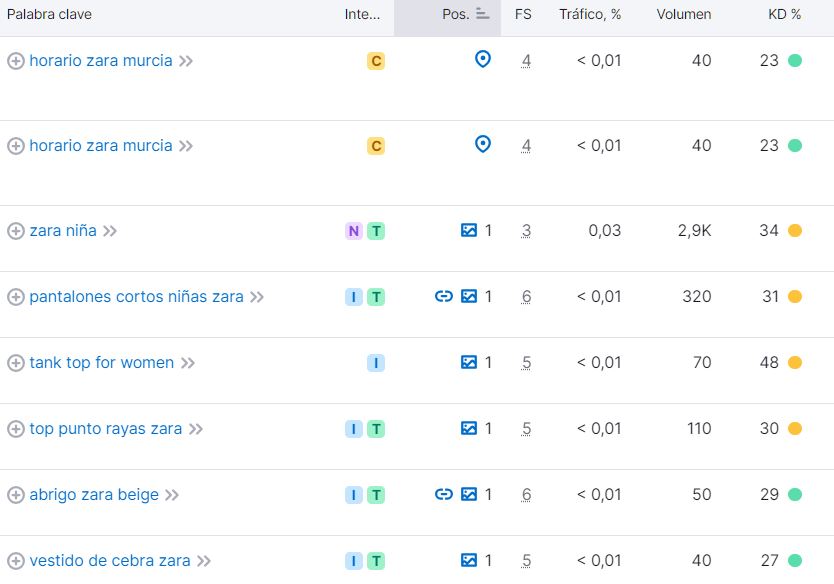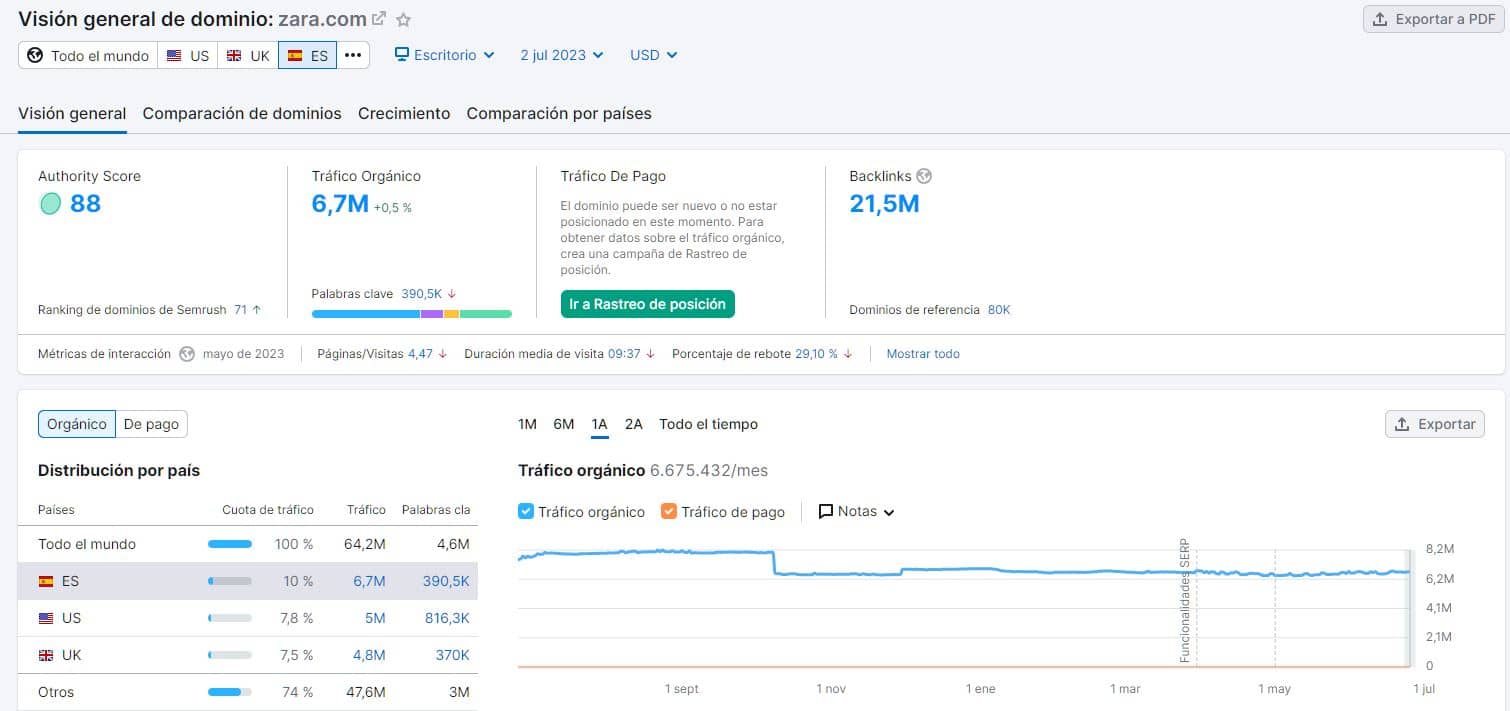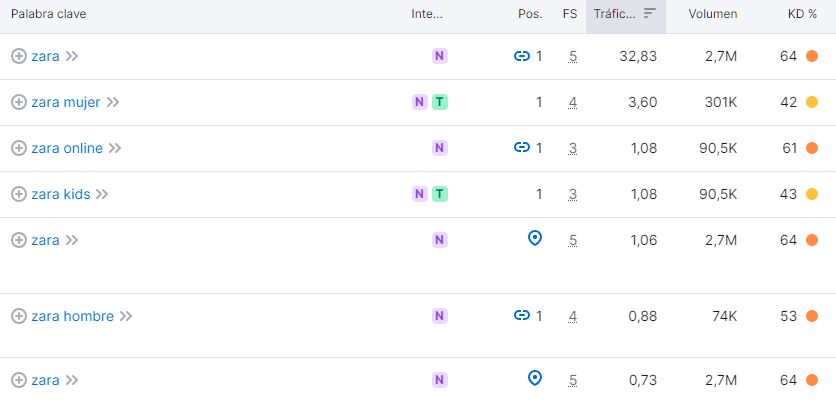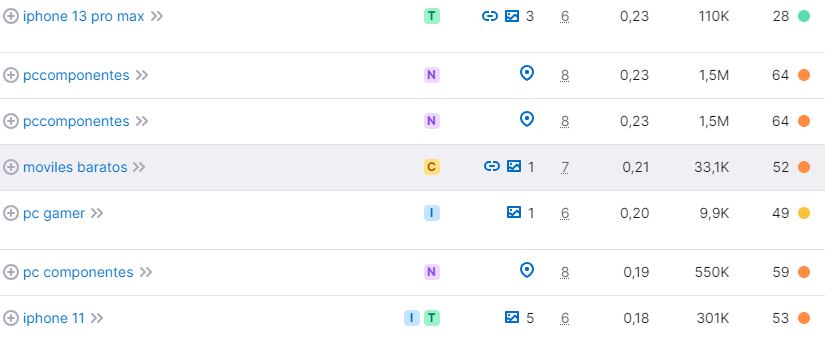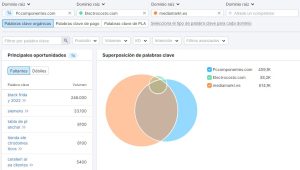
The search for keywords, or keyword research, is an essential part of any digital marketing strategy. If you want to increase the visibility of your website in search engines and attract more organic traffic, it is essential to understand what words your potential customers use when searching for information. In this article, we’ll explore what keyword research is and its basics, and then show you how you can use semrush to carry it out.
Try Semrush for free
What is a keyword research
The keywords
Ok, first of all, we should start by making it clear what we mean by a keyword.
A keyword, or keyword, is a word or phrase that we use to search for information on the Internet.
That is to say, it is the word or group of words that we enter in the bar of a search engine when we want to find something, but in a broad sense it could be applied to any other search enginesuch as that of a social network such as Instagram or that of an application store such as the Play store.
For example, “Strawberry ice cream” It is a keyword that you search for in Google when you want to read a recipe to make it at home. It is also when you look for it on YouTube to see a tutorial on how to make it or on Instagram to see… well, to see people eating strawberry ice cream on the beach, of course xD
Keywords are important because they help search engines understand the content of web pages and show the most relevant results for our searches. By choosing and using keywords, we can increase the chances of appearing in the results. That is, if you have a great recipe on your blog to make a delicious strawberry ice cream and you optimize it well from the SEO point of view, your article could appear as the first of the Google results when someone does that search.
Google search results for “strawberry ice cream”
Now yes: what is a keyword research
The keyword research, or keyword research, is the process of identifying and analyzing the most relevant and effective keywords for your business.
Conducting keyword research is crucial because it allows you to understand how your potential customers think and what terms they use to search online. By knowing the keywords they use, you can optimize your website, create relevant content, and drive organic traffic.
But before continuing, there are three concepts that you should keep in mind:
search volume
As the name suggests, search volume refers to how many times a keyword is searched in a given period. The higher the search volume, the higher the potential for organic traffic.
For example, in this screenshot from Semrush, we can see that the keyword “strawberry ice cream” has been searched an average of 1,300 times a month in the last twelve months in Spain, and 7,800 globally. As you can see, it seems that there is more interest in this flavor in Mexico than in Spain 😉
Keyword Difficulty
Keyword difficulty refers to the existing competition to rank in search results using that keyword. In the case of strawberry ice cream, Semrush tells us that it is a keyword relatively easy to position (difficulty: 25%). Of course, as long as you do careful and well-oriented content from an SEO point of view.
search intent
The search intent tells us what the user wants when they type a query in the search engine. With Semrush you will be able to differentiate:
navigation searches, in which the user searches for a specific page. In other words, when the user searches for “Brand”, it is because he wants to go to the marca.com website, so it may not make much sense to attack that keyword. When he searches for “Zara.com”, it’s because he wants to go to your online store. Instead the informative (“football today”, “how to watch the Champions League”), the commercial (“best football boots”) or the transactional (“Zara women’s clothing”) interest us much more.
The Zara.com website is positioned for multiple keywords with different search intentions such as: (I) informative, (N) Navigation, (T) Transactional, C (Commercial)
Offensive or defensive keyword research
Like in a game of chess, you can approach your keyword research from an offensive or defensive point of view. Both are valid approaches, but knowing which one you are interested in will help you to be more clear about how to carry out this process.
Defensive keyword research
Defensive keyword research seeks to identify and protect your own keywords already positioned. In this way, you will be able to maintain and strengthen your current position, something very useful especially if you are the one who is winning the game over your competitors 😉 or if you want to avoid being removed from the first position in a very relevant keyword for your business, one of those that generate a large proportion of your traffic.
In this case, the most important thing is that you monitor the performance of these keywords and adjust your content and SEO strategy to maintain or improve your ranking. Remember: it is vital that you regularly monitor your most relevant keywords.
In addition, it is essential that you analyze your competitors, to identify possible threats and take measures to defend your position in the search results.
Offensive keyword research
But if you are in a position of inferiority, or what you like is to play on the attack and try to conquer new keywords, you should bet on offensive keyword research. It would be about identify new opportunities and position yourself for relevant keywords that you are not yet taking advantage of.
How to do keyword research with Semrush
Semrush is one of the leading SEO tools on the market and includes several features designed to help you conduct keyword research. as you will see, semrush It allows you to obtain valuable information about keywords, search volume, keyword difficulty, identify the keywords used by your competitors…
Let’s see some keyword research tasks that you can carry out with Semrush:
Try Semrush for free 1. Know your keyword profile
By simply including your domain name in the Semrush search bar, you will be able to see your keyword profile: know how many you have ranking for, which ones are in the top 3 or top 10, and which of those are the most valuable. For example, this is the case of one of the ecommerce leaders, such as Zara.com.
As you can see, the number of keywords positioned by Zara has not stopped growing:
Here what we have seen about offensive or defensive approach applies. In a defensive approach, you will be very interested in knowing which are your main kws, and which are the ones that generate the most traffic.
So, if you go to the “best organic words” part, you can see that it is in first position for kws with a very high search volume, like “zara”. It would be a bit of a drama for them to lose them.
Spoiler alert: with the huge amount of content they generate about their brand and with the position of authority they have, it would be really difficult for them to lose them.
Obviously, these cases do not always refer to the brand itself. You can see it in the case of some of the main keywords of a completely different website with a lot of traffic, such as Pccomponents:
2. Related keywords and variations
Semrush has a tool called keyword magic toolwhich allows you to consult variations of a keyword, related questions and everything that can give you clues about how users search for that keyword and everything that is related to it.
As you can see, you can segment the search by countries, languages, questions… and all this with specific data on search volume and keyword difficulty, as well as many other interesting parameters.
These are the keywords related to “cheap mobiles”, one of the main keywords of Pccomponentes.com:
3. Keyword gap
Semrush’s “keyword gap” feature will allow you to discover in a very visual way the keyword profile of your competitors and, what is most interesting, which ones they share with you, which ones you beat them for and which ones they beat you for.
As you can see in the Venn diagram, Mediamarkt and PcComponentes have much more kws positioned than Electrocosto. Also, the three websites have many kws in common. If you go into detail, you will be able to discover what those keywords are, filter them by search volume, difficulty or which are those in which you are winning, among many other options.
And now that?
In any case, the most important factor in a kw research is you. With all these tools you should be able to select those that best suit your business, your objectives and your content profile.
As we have seen, it is not the same to do kw research with offensive as defensive intent, and a keyword with transactional search intent is not the same as a navigation one. Look at the search volume and the difficulty of the keywords, try to set ambitious but manageable goals and, of course, prepare an optimized content plan to meet the needs of those who search for those keywords.
And if I don’t have a website yet, where do I start?
If you have not launched your website, and you cannot assess your keyword profile, the ideal is that:
analyze the kws profile of your potential competitors use your knowledge of the market to start analyzing kws that you think may be interesting, and from there, discover new related kws.
Oh! and once you start it up, remember to make periodic reviews, to check how you are covering those keywords that you want to achieve, and how the organic traffic you receive from them varies.
Do not underestimate the power of keyword research and start using Semrush to improve your SEO and digital marketing strategy.
Try Semrush for free
Image: Depositphotos
Stay informed of the most relevant news on our Telegram channel
